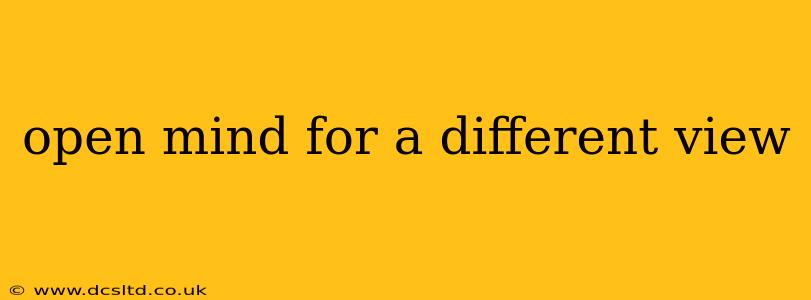Cultivating an Open Mind: Embracing Diverse Perspectives and Expanding Your Horizons
In today's interconnected world, the ability to embrace different viewpoints is more crucial than ever. An open mind isn't about agreeing with everything; it's about actively seeking out and considering perspectives that challenge your own. This fosters critical thinking, personal growth, and a deeper understanding of the complexities of the world around us. But how do we cultivate this essential skill? This article explores the practical steps to developing an open mind and the significant benefits it offers.
What does it mean to have an open mind?
Having an open mind isn't about being wishy-washy or lacking conviction. It's about possessing intellectual humility – recognizing that your understanding is incomplete and constantly evolving. It means being willing to:
- Listen actively and empathetically: Truly hearing what others have to say, even if you disagree, and trying to understand their perspective from their point of view.
- Challenge your own biases: Identifying your preconceived notions and assumptions and actively questioning their validity. We all have biases; the key is to acknowledge them and work towards mitigating their influence.
- Consider alternative explanations: Being willing to entertain different interpretations of events and information, rather than clinging to a single, pre-determined conclusion.
- Engage in respectful dialogue: Even when disagreeing strongly, maintaining a civil and respectful tone fosters constructive conversation.
- Embrace ambiguity and uncertainty: Accepting that not every question has a simple answer and being comfortable with nuance and complexity.
Why is it important to keep an open mind?
The benefits of cultivating an open mind extend far beyond simple tolerance. An open mind is essential for:
- Personal growth: Exposure to diverse perspectives expands your understanding of yourself and the world, leading to increased self-awareness and personal development.
- Improved decision-making: Considering multiple viewpoints leads to more informed and well-rounded decisions.
- Enhanced creativity and innovation: Challenging conventional wisdom and embracing new ideas fosters creativity and the development of innovative solutions.
- Stronger relationships: Empathy and understanding are the cornerstones of healthy relationships, both personal and professional.
- Greater tolerance and understanding: Exposure to different cultures and viewpoints reduces prejudice and promotes tolerance.
How can I develop a more open mind?
Developing an open mind is an ongoing process, not a destination. Here are some practical steps:
- Seek out diverse perspectives: Actively engage with people from different backgrounds, cultures, and belief systems. Read books and articles that challenge your worldview. Watch documentaries and listen to podcasts that explore diverse topics.
- Practice active listening: Focus on understanding the speaker's perspective rather than formulating your response. Ask clarifying questions to ensure you understand their point of view.
- Identify and challenge your biases: Regularly reflect on your own beliefs and assumptions. Ask yourself: "Why do I believe this?" and "Is there evidence to support this belief?"
- Embrace constructive criticism: Don't take criticism personally. Instead, use it as an opportunity to learn and grow.
- Practice empathy: Try to see things from another person's point of view. Imagine yourself in their situation and consider how you might feel.
- Be willing to change your mind: Recognizing that you might be wrong is a sign of intellectual humility and a crucial step in developing an open mind.
How can I overcome my biases?
Overcoming biases is a challenging but rewarding process. It requires self-awareness, critical thinking, and a commitment to continuous learning. Here are some strategies:
- Become aware of your own biases: Reflect on your upbringing, experiences, and social circles to identify potential biases.
- Seek out diverse information sources: Avoid echo chambers and actively seek out information that challenges your existing beliefs.
- Engage in critical thinking: Analyze information carefully, considering its source and potential biases.
- Practice perspective-taking: Actively try to understand the perspectives of others, even those you disagree with.
- Be open to changing your mind: Recognize that your beliefs may not always be accurate and be willing to adjust them based on new information.
What are the benefits of having an open mind in the workplace?
In a professional setting, an open mind fosters collaboration, innovation, and problem-solving. Employees with open minds are more likely to:
- Contribute to a more inclusive and diverse workplace: Fostering a welcoming environment for individuals from all backgrounds.
- Generate creative solutions: Welcoming diverse perspectives leads to more innovative and effective solutions to complex problems.
- Build stronger relationships with colleagues: Respecting diverse viewpoints enhances collaboration and strengthens team dynamics.
- Improve communication and conflict resolution: Active listening and understanding different perspectives are crucial for effective communication and conflict resolution.
By actively cultivating an open mind, we enhance our lives, our relationships, and our understanding of the world. It's a continuous journey, requiring self-reflection, empathy, and a willingness to learn and grow. The rewards, however, are immeasurable.
